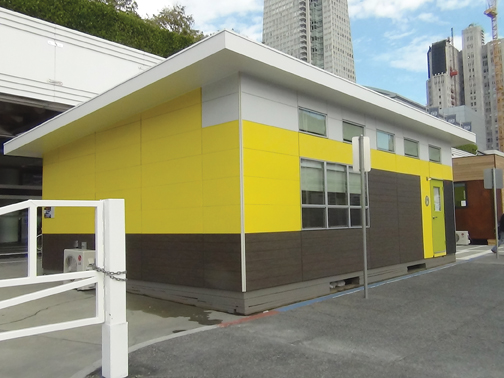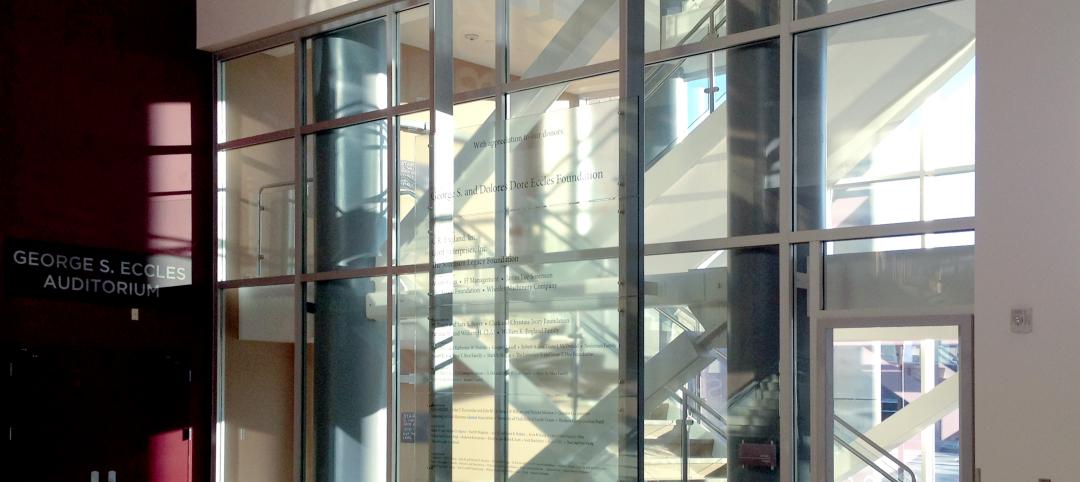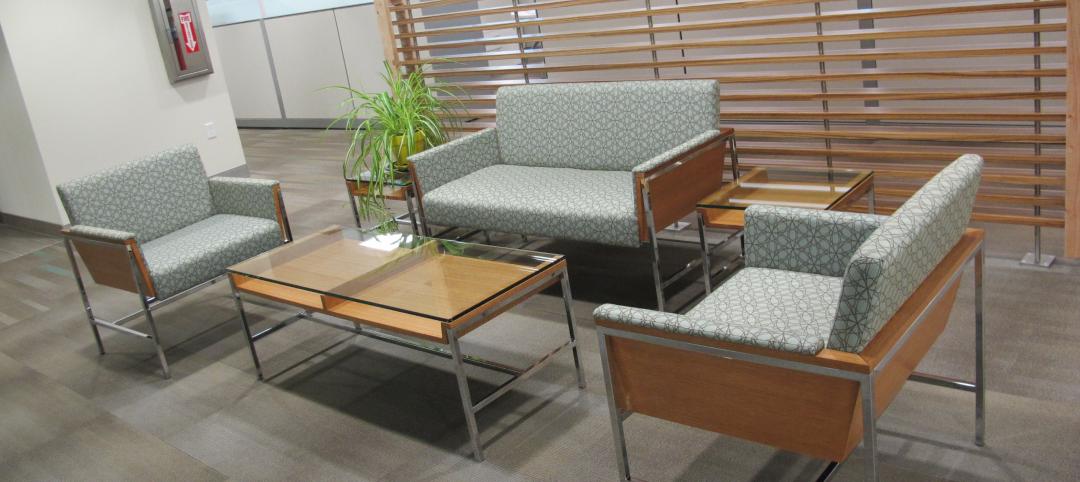At Greenbuild 2012, education and sustainability took center stage with the arrival of the SAGE modular classroom, designed and built by a team from Oregon. The demonstration facility, which was on display November 13-15 at the Moscone Center in San Francisco, was conceived and co-sponsored by Building Design+Construction and its parent organization, SGC Horizon LLC.
The genesis of the project came from the Department of Architecture at Portland (Ore.) State University, in particular Assistant Professor Margarette Leite. In examining the role of architecture in education spaces, she and her students recognized a growing need for sustainably designed classrooms nationwide.
While modular classrooms—or “portables,” as they’re commonly known—have been around for decades, some practitioners in the modular building industry feel they have not been used to their full potential. “School district administrators typically look at this kind of space as a temporary fix,” says Garth Haakenson, President/CEO of Pacific Mobile Structures, Chehalis, Wash. “But the reality is that these buildings stay up for 20 to 30 years. When they’re built to a minimum standard and not maintained over that time period, the quality of the classroom deteriorates and you have kids learning in a substandard environment.”
SETTING OUT ON A MISSION
With that historical background in mind, Leite and her students set about changing the design of modular classrooms—to create sustainably designed, factory-built classrooms that were good for children’s health and well-being, but also practical. “The only way to do that is to find a way to keep it affordable for school districts,” she said.
As the project began to pick up steam, the staff of Oregon Governor John Kitzhaber stepped in. The modular classroom was named an official “Oregon Solutions” project. This program, established in 2011, promotes “sustainable solutions to community-based problems that support economic, environmental, and community objectives, and are built through the collaborative efforts of businesses, government, and nonprofit organizations.”
With the governor’s backing secured and the project becoming more and more of a reality, the team grew to include Portland State’s College of Engineering, and Institute for Sustainable Solutions, in conjunction with AIA Portland. There was just one problem—the team didn’t have a buyer for the proposed classroom. “We were going to try and raise money for it if we had to,” said Leite. “Luckily a buyer stepped in and made it happen pretty quickly.”
That buyer was Haakenson and Pacific Mobile Structures, which has a branch in Oregon City, near Portland. With funding secured, modular builder Blazer Industries, Aumsville, Ore., got to work. “I think it was October 5 or so that we actually started construction,” said Kendra Cox, Blazer Industries’ Project Manager. “The building shipped [to San Francisco] November 9. We were working on the design, working on the pricing, every single last-minute item. It was pretty hectic.”
They called it SAGE, for Smart Academic Green Environment. The SAGE modular classroom came in at $77 a square foot in construction costs, about half that for conventionally designed and constructed “portables,” proving that sustainability and affordability were not incompatible.
THE CLASSROOM AS TEACHING TOOL
The shortage of high-quality classrooms is a national problem, said Sergio Palleroni, Professor of Architecture at Portland State and chief designer of the SAGE classroom. “Coming to the Greenbuild conference, everybody was feeling, ‘OK, we’re having this national crisis, what do we do about it?’” said Palleroni, a Senior Fellow at PSU’s Center for Sustainable Solutions and a founder and faculty member of the federally funded Green Building Research Lab.
While the entire Building Team was excited about the generous feedback they received from Greenbuild attendees while the classroom was on display at Moscone, they were equally interested in the goal of opening people’s eyes to the potential of mobile classrooms.
Haakenson said it was important to get AEC professionals and the public to see that mobile structures could be more than portable classrooms. “There are a lot of interesting features about this structure that are completely different than anyone’s previous expectations of a portable classroom,” he says. Changing the stereotype of the modular classroom was a key component of the SAGE team’s strategy.
TAKING THE CONCEPT TO THE NEXT LEVEL
With a strong first showing at Greenbuild behind them, the team now hopes that this is just the start of a revolution in the creation of sustainably designed and constructed modular classrooms.
“There’s a lot of interest nationwide, so the next step is to start addressing requests from other states and figure out how to find manufacturers and contractors that believe in the project,” said Blazer Industries’ Cox.
Portland State’s Leite recommends that future modular classroom Building Teams collaborate early and often. “A lot of projects don’t make it because they’re not efficient to build, so they become too expensive,” she says. “That’s why it’s important to start working together right from the beginning.” +
Related Stories
| Jul 16, 2012
Business school goes for maximum vision, transparency, and safety with fire rated glass
Architects were able to create a 2-hour exit enclosure/stairwell that provided vision and maximum fire safety using fire rated glazing that seamlessly matched the look of other non-rated glazing systems.
| Jul 12, 2012
New firm RSK Avanti Partners offers market development services
Full-service consulting firm is focused on working with product manufacturers, designers, specifies and contractors in the building construction market.
| Jul 12, 2012
Chicago Public Schools names Lend Lease team as construction manager
Under this Capital Improvement Program, the Lend Lease team will be responsible for renovation and life safety work at over 100 Chicago Public Schools across the City.
| Jul 12, 2012
Cramer joins Gilbane’s NYC Business Development Team
New Business Development Manager brings over 30 years of experience to Gilbane.
| Jul 12, 2012
Cardoso joins Margulies Perruzzi Architects
Senior architect brings experience, leadership to firm’s healthcare practice.
| Jul 12, 2012
EE&K and Knutson Construction selected for the Interchange in Minneapolis
Design-build contract for $79.3 million transportation hub will connect transit with culture.
| Jul 11, 2012
New BDC University course: Design Criteria for Ceramic Tile/Stone Installations
Everyone that successfully completed to course will receive 1.0 HSW/LU AIA LU.
| Jul 11, 2012
Perkins+Will designs new home for Gateway Community College
Largest one-time funded Connecticut state project and first designed to be LEED Gold.
| Jul 11, 2012
HOK honored with Los Angeles architectural award
42nd annual awards from the Los Angeles Business Council honor design excellence.
| Jul 11, 2012
Skanska relocates its Philadelphia metro office
Construction firm’s new 19,100-sf office targets LEED Gold certification.

















